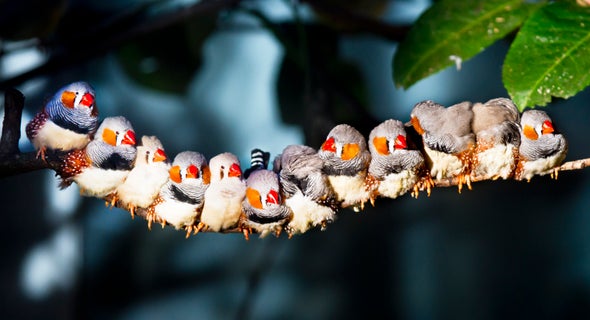(单词翻译:单击)
听力文本
This is Scientific American's 60-second Science. I'm Jason Goldman.
Babies are constantly surrounded by human language, always listening and processing. Eventually, they put sounds together to produce a "Daddy" or a "Mama." But what is still elusive to neuroscientists is exactly how the brain works to put it all together.
To begin to figure it out, a team of researchers turned to a frequent stand-in for human infants when it comes to language learning: the song-learning zebra finch.
"Well, we've known for about 70 years or so that songbirds learn their song by first forming a memory of their father's song or another adult's song. And then they use that memory in order to guide their song learning."
Neuroscientist Todd Roberts from the UT Southwestern Medical Center in Texas.
"It's been a long-term goal of the field to try to figure out how or where in the brain this memory is. This form of learning, this type of imitative learning that birds do, is very similar to the type of learning that we engage in on a regular basis—particularly when we're young, we use this type of learning to guide our speech learning."

Roberts and his team had a hunch that the interface between sensory areas and motor areas in the brain was critical for this process, and they zeroed in on a group of brain cells called the NIf.
"In order to really prove that we were on the right track and that we could identify these circuits, we thought that maybe we could go in and see if we could implant a false memory."
To do it, the researchers used a technique called optogenetics. First, they used a virus to cause the neurons in the birds' NIf to become sensitive to light. Then, using a tiny electrode as a flashlight, they activated the neurons. The length of each pulse of light corresponded with the amount of time the neurons would fire. And the birds' brains interpreted that time period as the length of each note.
Soon enough, the birds began to practice the notes they had learned, even though they never really heard the sounds in the first place. The songs that these birds began to sing wouldn't win them any prizes. But amazingly, the birds produced them in the correct social situations. The researchers say this is the first time anybody has pinpointed a part of the brain necessary for generating the sorts of memories needed to mimic sounds. The study was in the journal Science.
"This line of research is going to help us start to identify where in the brain we encode memories of pertinent social experiences that we use to guide learning. And we know that there are several neurodevelopmental disorders in people that have really profound effects on this type of learning."
Thanks for listening for Scientific American's 60-second Science. I'm Jason Goldman.
参考译文
这里是科学美国人——60秒科学。我是杰森·古德曼。
婴儿总被人类的语言所包围,他们一直在倾听和处理这些语言。最终,他们将不同的声音组合起来,说出“爸爸”或“妈妈”。但对神经科学家来说,大脑到底是如何将这些声音组合在一起的,仍然是个谜。
为了解决这个问题,一个研究小组找来了人类婴儿在语言学习方面经常使用的替身:学习鸣叫的斑胸草雀。
“大约70年前我们就已经知道,鸣禽通过听其父亲或其他成年鸟的鸣叫来形成初次记忆,以此学习歌唱。之后他们用这些记忆来指导歌唱学习。”
得克萨斯州西南医学中心的神经科学家托德·罗伯茨说到。
“此领域的一个长期目标是,试图弄清这种记忆如何在大脑中形成或确定其在大脑中的位置。这种学习形式,鸟类进行的这种模仿学习,非常类似于我们经常采用的学习类型——特别是我们年轻时,会用这种学习类型指导语言学习。”
罗伯茨及其团队预感到,大脑感觉区和运动区之间的界面是这一学习过程的关键,他们将注意力集中在一组名为NIf的脑细胞上。
“为了证明我们是对的,并且能识别出这些回路,我们想或许可以试试看能否植入假记忆。”
为此,研究人员使用了一种被称为“光遗传学”的技术。首先,他们用病毒使鸟类“Nif”脑细胞上的神经元对光敏感。然后,他们用微小电极做闪光灯,刺激神经元。每个光脉冲的长度与神经元点火的时间量相对应。而鸟类大脑将这个时间段解释为每个音符的长度。
很快,鸟儿开始练习它们学到的音符,尽管它们起初从未真正听过这些声音。这些鸟刚开始学的歌不会带来任何好处。但令人惊讶的是,鸟儿在正确的社会环境中产生了这些歌。研究人员说,这是人类首次准确找到大脑中产生模仿声音所需记忆的部分。这项研究发表在《科学》期刊上。
“这系列研究将帮助我们,开始识别大脑中哪个区域将指导学习的相关社会经验编成记忆。我们知道,人类有几种神经发育障碍对这种学习类型有着非常深远的影响。”
谢谢大家收听科学美国人——60秒科学。我是杰森·古德曼。
译文为可可英语翻译,未经授权请勿转载!
重点讲解
重点讲解:
1. put together 组装;拼合;组合;
He took it apart brick by brick, and put it back together again.
他一块砖一块砖地把它拆开,然后又把它组合起来。
2. engage in 参与;从事;
Industry leaders want scientists to engage in fundamental research, not applied research.
行业领袖希望科学家从事基础性研究,而非应用性研究。
3. correspond with 相类似;相关;相对应;
Your account of events does not correspond with hers.
你对事情的陈述与她说的不相符。
4. in the first place 起初;一开始;
I don't think we should have been there in the first place.
我认为我们从一开始就不该在那儿。


